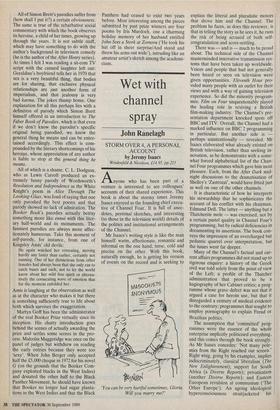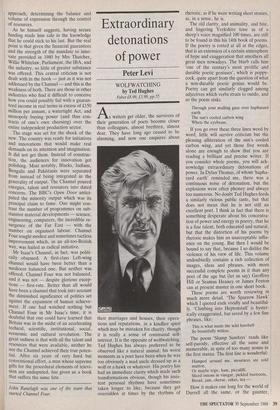Wet with channel spray
John Ranelagh
STORM OVER 4, A PERSONAL ACCQUNT by Jeremy Isaacs
Weidenfeld & Nicolson, £14.95, pp.215
Anyone who has been part of a venture is interested to see colleagues' accounts of their shared experience. This book is about the stormy times Jeremy Isaacs enjoyed as the founding chief execu- tive of Channel Four. It is full of anec- dotes, personal sketches, and interesting (to those in the television world) details of the politics and institutional arrangements of the Channel.
Mr Isaacs's writing style is like the man himself: warm, affectionate, romantic and informal on the one hand; terse, cold and precise on the other. With this book, naturally enough, he is getting his version of events on the record and is seeking to 'You can be very hurtful sometimes, Gloria. Will you marry me?' explain the liberal and pluralistic motors that drove him and the Channel. The problem he faces, as does this reviewer, is that in telling the story as he sees it, he runs the risk of being accused of both self- congratulation and score-settling.
There was — and is — much to be proud about. The technical side of the Channel masterminded innovative transmission sys- tems that have been taken up worldwide. Voices and people that had not generally been heard or seen on television were given opportunities. Eleventh Hour pro- vided many people with an outlet for their views and with a way of gaining television experience. So did the minority program- mes. Film on Four unquestionably played the leading role in reviving a British film-making industry. The Channel's pre- sentation department knocked spots off BBC and ITV. Overall, the Channel had a marked influence on BBC 2 programming in particular. But another side is perhaps unintentionally — revealed. Mr Isaacs elaborated what already existed on British television, rather than seeking in- novation, as he demonstrates with a some- what forced alphabetical list of the Chan- nel Four programmes which gave him most pleasure. Each, from the After Dark mid- night discussions to the dramatisation of Shelley's Zastrozzi', would have fitted just as well on one of the other channels.
It is characteristic of how he interprets his stewardship that he sophisticates the account of his conflict with his chairman, Edmund Dell. The latter — anything but a Thatcherite mole — was exercised, not by a certain pastel quality in Channel Four's programming, but by radical deficiencies in documenting its assertions. The book con- veys the impression of an overcharged but pedantic quarrel over interpretation, but the issues went far deeper.
Many of the Channel's factual and cur- rent affairs programmes did not stand up to rigorous enquiry: a history of the Greek civil war told solely from the point of view of the Left; a profile of the Thatcher administration that proved to be a hagiography of her Cabinet critics; a prog- ramme whose grave defect was not that it argued a case for heroin use, but that it disregarded a century of medical evidence to the contrary; programmes that sought to employ pornography to explain Freud or Brazilian politics.
The assumption that 'committed' prog- rammes were the essence of the whole enterprise implicitly politicised everything, and this comes through the book strongly. As Mr Isaacs concedes: 'Not many pole- mics from the Right reached our screen.' Right wing, going by his examples, implies indiscriminately, classical liberalism (The New Enlightenment); support for South Africa (a Diverse Reports); privatisation (another Diverse Reports); and Eastern European revulsion at communism (`The Other Europe'). An ageing ideological hyperconsciousness straitjacketed his approach, determining the balance and volume of expression through the control of resources.
As he himself suggests, having secure funding made him safe in the knowledge that he could stick to his last. But the real point is that given the financial guarantees and the strength of the mandate to inno- vate provided in 1980 by Mrs Thatcher, Willie Whitelaw, Parliament, the IBA, and the industry, so little of greater substance was offered. This central criticism is not dealt with in the book — just as it was not addressed by the Channel — and this is the weakness of both. There are those in other industries who find it difficult to conceive how you could possibly fail with a guaran- teed income in real terms in excess of £150 million per annum, a watertight Act, and monopoly buying power (and thus con- tracts of one's own choosing) over the entire independent production sector.
The stage was set for the shock of the new. The country was ready for initiatives and innovations that would make real demands on its attention and imagination. It did not get them. Instead of construc- tion, the audiences for innovation got polishing. Most notably, Blacks, Indians, Bengalis and Pakistanis were separated from instead of being integrated in the generality of output. The Channel poured energies, talent and resources into dated concerns. The BBC's Open Door antici- pated the minority output which was its principal claim to fame. One might con- trast the number of programmes on sub- stantive material developments — science, engineering, computers, the incredible re- surgence of the Far East — with the number on organised labour. Channel Four sought modest and sometimes tactless improvement which, in an all-too-British way, was hailed as radical initiative.
Mr Isaac's Channel, in fact, was politi- cally obsessed. A first-class Left-wing channel would have been better than a mediocre balanced one. But neither was offered. Channel Four was not balanced, and it was not — despite glorious excep- tions — first-rate. Better than all would have been a channel that took into account the diminished significance of politics set against the expansion of human achieve- ment. If one had watched nothing but Channel Four in Mr Isaac's time, it is doubtful that one could have learned that Britain was in the midst of an accelerating techical, scientific, institutional, social, economic and cultural revolution. The great sadness is that with all the talent and resources that were available, neither he nor the Channel achieved their true poten- tial. After six years of very hard but conventional effort, a man whose supreme gifts for the procedural elements of televi- sion are undisputed, has .given us a book that suffers the same fate.
John Ranelagh was one of the team that started Channel Four.



























































 Previous page
Previous page